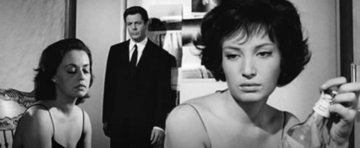by Omar Baig
“One day, after I had completed my studies” at École normale supérieure, philosopher François Laruelle reminisces in From Decision to Heresy (2012), “I sat at my desk and I cleared away all the books of everything that had already been written” (1). On a blank sheet of paper, Laruelle resumed taking notes, except this time he scoured himself for insights. Before starting his master’s thesis, “The Absence of Being,” however, he saw Michelangelo Antonioni’s moody, atmospheric film, La Notte (1961): inspiring Laruelle to inform his legendary graduate supervisor, Paul Ricoeur, of his intent to abandon their planned exegesis of G.W.F. Hegel’s early work. After earning his doctorate, he spent the next three decades quietly pondering the materiality of philosophy and, by the 1980s, explored philosophy as the material for an art.

Instead of pursuing so-called philosophical wisdom, Laruelle wondered if he could make art with philosophy or make poetry of thought that expresses “something poetic with concepts.” He sought to “forward some philosophical thesis” or “practice that could destroy, in a certain way, the classical usage of philosophy” (Heresy, 29). His first five books, from 1971 to 1981, offered fairly standard critiques of French and German philosophers: like Friedrich Nietzsche, Martin Heidegger, Giles Deleuze, Jean-Luc Nancy, and Jacques Derrida; yet he did not probe “the destruction of philosophy” until his sixth and seventh books in 1981 and 1985. Deconstructionists, like Derrida and Ricoeur, momentarily eclipsed the then prevailing phenomenological approach of their predecessors, such as Husserl and Heidegger: “only to become precisely a repetition of Philosophy or philosophy qua philosophy” (Principles, xiv).
Even these iconoclasts, however, had ultimately protected the dignity of philosophy and bared the burden of their homage, affirming the very tradition they once rebelled against: which relies on opposing poles, or philosophical dyad—like subject vs. object, transcendental idealism, etc.—claims to “reinvent” how human’s access or translate between their subjective experiences and an external reality. Yet philosophers can neither “objectively” translate reality into definitive true or false statements nor verify its claims outside their recursive expression (i.e., by language games): which both over- and under-determine reality with each account. In short, philosophy was made for man, as “the pure and general form of the World and the World as the immanent object of philosophy,” but man was not made for philosophy (xx). Instead of philosophical homage, Laruelle integrates scientific theories and practices to life. Read more »
